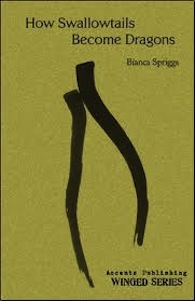Book Review
How Swallowtails Become Dragons by Bianca Spriggs. Accents Publishing, 2011. $5
Reviewed by Margaret Rozga
Transitions can be difficult. Even when the new is more powerful, the old has advantages, or at least familiarity. In the vision of Bianca Spriggs, however, the driving force of life, or death, is urgent and rarely allows anyone to hang back. The poems in her new chapbook, How Swallowtails Become Dragons pulse with energy. In nature, in history, in love, in myth and in the universe, taking new forms, becoming what one was not, is a fundamental and marvelous experience.
For the most part, especially in the first five of these twenty poems, Spriggs celebrates the newly powerful being that emerges when “the resin/running through us is so hot/and so sweet it overwhelms, changing us” (1). It is “alchemy” that makes the swallowtail, and perhaps us, more substantial and valuable, then more free, and finally though more ethereal, yet more powerful and pervasive.
water to blood
blood to gold
gold to flesh
flesh to wingswings to wind.
The repetition and even arrangement of the words on the page make the process a natural set of steps that belies misgivings about the timing of the transformation as expressed in the opening lines of the poem.
The dying wasp, cat, and raccoon in the next several poems are also powerful beings described in vivid terms: the wasp in "Slow Dance" with her “brass bullet of a body” (2); the cat in “Omen” that brings bad luck barreling in like “thunderheads in a storm” (3); the raccoon in “Totem” that “hauls ass, black nails/clicking first on the tiles, then the driveway” (4).
My favorite of these poems is “Waterbody” where the urban mermaid who’s “been living off of soybean oil/from sardine cans” changes places, and body type, with the speaker who rescued her and who then becomes “an ocean remembering/she is an ocean” (8).
The next several poems focus on ecological, historical and mythic transformations. In “The Legend of Negro Mountain,” trees acquire mobility when Nemesis takes “a bullet in his back” and “they stayed bad dreams, lost leaves, bark, limbs, / lost a whole white winter to reach his body” (9).
The allusions to Greek myth in “Orfeu Negro” make this poem seem more academic, but its reference to Eurydice provides a smooth transition to the next poem, “Black Market,” where Eurydice is the name of an actual person, an enslaved woman. The poem’s epigraph notes that bodies of slaves were sometimes donated or sold to medical schools. This is what happens to Eurydice Thomas who even dead is not merely passive. She gives the “New Massa” both “just what he was looking for/ And plenty that he wasn’t” (12).
Love as a transforming force is the topic of several other poems. The language in these poems, among the shortest in the book, is generally more subdued, though the action described may be intense and dramatic. “How l Knew He Loved Me,” a simply stated two line poem, can serve as an example.
There we were—crushed. He had thrown me to the ground,
shielding my heart through my back from bullets.
The concluding poem “Legend of the Baobab Girl” celebrates an all-encompassing transformation. This girl “who cannot get enough/ of everything” opens herself to the flux of experience.
And she lives until she is a pillar, ancient and broad,
until her feet are altars while her hands are rafters,
and she has caught every single daydream
from every single wayward breeze on her tongue
and whistles then all into petticoat clouds lining
the horizon’s skirt, and everything she reaches for
reaches back (25).
In the well-crafted and energetic poems of this volume, Bianca Spriggs offers powerful visions of transformation and hope. The work of this rising star on the poetic horizon deserves to be widely known.
Margaret Rozga is a lifelong resident of Wisconsin. Her book Two Hundred Nights and One Day features poems about the 1967-68 open housing marches in Milwaukee and was named an outstanding achievement in poetry for 2009 by the Wisconsin Library Association. She blogs about social justice and poetry at benupress.com/For-Words.


